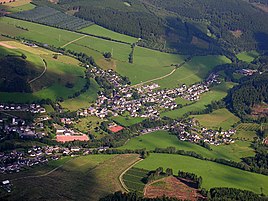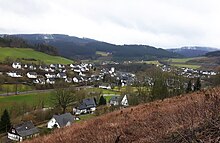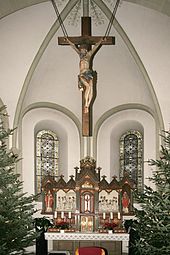Fleckenberg
|
Fleckenberg
City of Schmallenberg
Coordinates: 51 ° 8 ′ 8 ″ N , 8 ° 15 ′ 39 ″ E
|
||
|---|---|---|
| Height : | 354 m | |
| Residents : | 1545 (Dec. 31, 2019) | |
| Incorporation : | 1st January 1975 | |
| Postal code : | 57392 | |
| Area code : | 0 29 72 | |
|
Location of Fleckenberg in Schmallenberg |
||
|
Aerial view of Fleckenberg
|
||
Fleckenberg is a district of the city of Schmallenberg .
geography
location
Fleckenberg is located at the foot of the Rothaargebirge, in the southwest of the Hochsauerlandkreis, three kilometers southwest of Schmallenberg and one kilometer south of Beerenberg (Sauerland) on the federal highway 236 . The Lenne and Latrop flow through the village . Around the village there are landscape protection areas such as the landscape protection area on the outskirts of Fleckenberg and the extensive grassland landscape protection area on the lower slopes of the Beerenberg north of Fleckenberg .
Neighboring places
Neighboring places are Schmallenberg , Jagdhaus , Waidmannsruh , Wulwesort , Latrop , Harbecke , Werpe and Lenne .
history
In 1283 a Rychard von Vleckenberg was mentioned in a document from the Grafschaft monastery . There were no references to a place Fleckenberg until the 14th century. On August 13, 1301, the name Fleckenberg, differentiated between Oberfleckenberg and Niederfleckenberg, was mentioned for the first time in a document issued in Schmallenberg. In 1645, Fleckmar was mapped on the Westphalia Ducatus map.
The fortified court border between Bilstein and Grafschaft ran between Oberfleckenberg and Niederfleckenberg. To both dishes were from time to time Schnadegänge held that expanded on Grafschafter side over three days. The Bilsteiners needed ten full days with one day of rest for their Schnadegang. A Schnadegang has been handed down from April 23, 1667, when a brilliant company came to Gleidorf on behalf of the Elector of Cologne. The electoral Cologne Oberjäger Freiherr von Weichs, Droste von Bilstein, Freiherr von Fürstenberg, the electoral gographer of the office of Fredeburg, Friedrich von Stockhausen zu Dorlar, the electoral bailiff von Bruch zu Fredeburg, the Oberkirchen judge Trilling, all electoral officials appeared with magnificent entourage the offices of Fredeburg and Bilstein as well as the Vogt zu Siedlinghausen and the elders of the office of Fredeburg on horseback. With armed teams, in coats of arms and helmets, as well as with musicians, people marched around the entire Patrimonial Court of Oberkirchen on foot or on horseback after the witness had been solemnly taken. After three days the magnificent train returned to Gleidorf through the Lennetal.
On March 28, 1900 Niederfleckenberg received approval to set up a parish . In 1920 the two towns of Oberfleckenberg and Niederfleckenberg were politically merged. Up to this point in time, the Grafschaft for Oberfleckenberg (ecclesiastically until 1920) and Wormbach for Niederfleckenberg were politically responsible. At the same time, the community of Fleckenberg emerged from the localities of Oberfleckenberg, Jagdhaus, Wulwesort and Niederfleckenberg (size of the community area 16.23 km²).
As part of the municipal reorganization in North Rhine-Westphalia, Fleckenberg became a district of the city of Schmallenberg on January 1, 1975. In 1977 Fleckenberg won the national competition Our village should become more beautiful and was named the Federal Gold Village .
Population development
| year | Residents |
|---|---|
| 1818 | 333 |
| 1885 | 527 |
| 1905 | 621 |
| 1925 | 772 |
| 1950 | 1,285 |
| 1961 | 1,258 |
| 1970 | 1,440 |
| 1974 | 1,550 |
| 2003 | 1,545 |
| 2005 | 1,545 |
| 2008 | 1,551 |
| 2015 | 1,571 |
politics
Community leader, mayor
- Leo Lingemann (1920–1935 community leader)
- Leo Lingemann (1935–1945 Mayor)
- Josef Scheider (1945–1948 mayor, CDU)
- Josef Scheider (1948–1949 mayor, independent)
- Franz Wiese-Hanses (1949–1952 Mayor, CDU)
- Franz Wiese-Hanses (1952–1956 Mayor, CDU)
- Franz Wiese (1956–1961 Mayor, CDU)
- Günther Wulff (1961–1964 Mayor, CDU)
- Günther Wulff (1961–1969 Mayor, FWG)
- Karl-Hans Richart-Willmes (1969–1973 Mayor, CDU)
- Heinz Steinhoff (1973–1974 Mayor, CDU)
Community directors
- Klaus Siebenkotten (1945–1957)
- Bernd Scholl (1957–1974)
Coat of arms and flag
The interior minister of North Rhine-Westphalia approved the coat of arms and the flag on November 6, 1963. Even after the municipal reorganization that came into force on January 1, 1975 and the place became part of the city of Schmallenberg, Fleckenberg is allowed to use its coat of arms according to the statutes of the city of Schmallenberg and continue to use his flag for representative purposes.
Attractions
There are 185 monuments in the Schmallenberg urban area. Some of them are in Fleckenberg. The list of architectural monuments in Schmallenberg lists the monuments with a brief description. The main attractions include:
- Hesse cutlery factory (technical museum)
- the historic Ibach organ in the parish church of St. Antonius
- the chapel of St. Agatha and St. Gertrud from the 17th century
→ See also: List of natural monuments in Schmallenberg
Economy and Infrastructure
economy
Fleckenberg lives from agriculture and forestry, tourism, craft and small industry (sawmills).
education
There is a primary school and a kindergarten in Fleckenberg.
Personalities
- Johann Benedikt Willmes (1743–1823), German lawyer, justice of the peace and university professor
Honorary citizen of Fleckenberg community
- The Spiritual Councilor Josef Grimme († April 10, 1964) was given the honorary citizenship of Fleckenberg on the occasion of his 90th birthday on May 20, 1958 because of his services to the unification of the community and the building of a church.
- The teacher Hedwig Wurmbach († July 31, 1971) became an honorary citizen on March 6, 1971 because of her commitment in the social and charitable area. Already in 1963 she received for her church services from Pope John XXIII. the order Pro ecclesia et pontifice .
literature
- City of Schmallenberg (ed.): Our village Fleckenberg , 1996.
- Catholic parish Fleckenberg (ed.): 100 years parish St. Antonius Fleckenberg 1900–2000 .
- Catholic parish office Fleckenberg, Pastor Winfried Wirtz 2005 (Ed.) The parish church St. Antonius Einsiedler Fleckenberg (for the 100th anniversary of the parish church 2005).
- Förderverein pro Fleckenberg (ed.): What was reported . Reports on Fleckenberg, Jagdhaus, Waidmannsruh and Wulwesort by Bruno Ermecke, 150 years of St. Johannes Rifle Brotherhood of Bruno Ermecke and Hubertus Schmidt, 2007.
- Friedrich Albert Groeteken , History of the parishes of the dean's office in Wormbach in the Meschede district in the Archdiocese of Paderborn, Volume II, part 5: History of the Fleckenberg parish , 1957.
- Karl Hartung Castrop-Rauxel (Ed.) 1938: Fleckenberg in the Sauerland .
- Josef Lauber: Stammreihen Sauerland families, volume IV, parish Berghausen - Fleckenberg - Lenne , Richard Schwarzbild dissertation printing Witterschlick near Bonn, 1977
Web links
- Website of the Fleckenberg Tourist Association
- Fleckenberg in the Westphalia Culture Atlas
Individual evidence
- ↑ Population figures Schmallenberg 2019 , accessed on June 30, 2020
- ↑ FA Groeteken 1957, The Benedictine Abbey Grafschaft, the parish Grafschaft and its daughter community Gleidorf, p. 108.
- ↑ Stephanie Reekers: The regional development of the districts and communities of Westphalia 1817-1967 . Aschendorff, Münster Westfalen 1977, ISBN 3-402-05875-8 , p. 234 .
- ^ Federal Statistical Office (ed.): Historical municipality directory for the Federal Republic of Germany. Name, border and key number changes in municipalities, counties and administrative districts from May 27, 1970 to December 31, 1982 . W. Kohlhammer, Stuttgart / Mainz 1983, ISBN 3-17-003263-1 , p. 335 f .
- ^ Eduard Belke, Alfred Bruns, Helmut Müller: Communal coats of arms of the Duchy of Westphalia. Arnsberg 1986, ISBN 3-87793-017-4 , p. 147.








